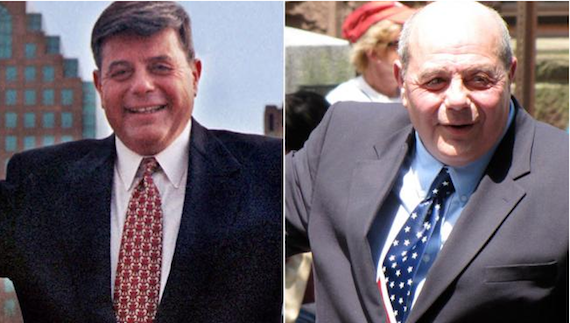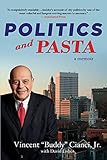
When I heard the news that Buddy Cianci — serial felon, wearer of atrocious toupees, revered and reviled former mayor of Providence, R.I. — had died on Jan. 28 at the age of 74, my first thought was not about death. It was about my birth as a writer. In May of 1976, a free Providence weekly called Fresh Fruit published my interview with Cianci, then the city’s brash young Republican mayor. Forty years later, I still own a crumbling clip of that interview. Maybe that’s not surprising since that clip is the first piece of writing I ever published, the first time I saw my byline in print. It’s my birth certificate. Writers tend to cherish such things.
When I interviewed him, Cianci had been in office for 16 months and I was one month away from my college graduation. More to the point, I was on a caffeine- and amphetamine-fueled binge to finish writing the final chapters of a history of the city of Providence, an independent-study project I’d been working on for two years because I’d become intoxicated by the city’s crazy quilt of ethnic neighborhoods, its fluorescent Mob presence, its post-industrial ruins, its wobbly triple-deckers and Greek Revival gems, its scuzzy waterfront, the milky fogs that spilled in off Narragansett Bay, the overall sense that this was a once-mighty shipping and manufacturing center the best times of which were long past. The place felt forgotten. The Wall Street Journal dismissed Providence as “a smudge beside the fast lane to Cape Cod.” That’s precisely what I loved about the place: it was the un-Boston, with little of the conventional New England charm. And it was a prolific incubator of criminals. Jimmy Breslin might have had Buddy Cianci in mind when he said, “Providence is where the best thieves come from.” What better way to end my elegiac history of this faded old city than by interviewing its optimistic, forward-looking young mayor?
For as far back as anyone could remember, politics in Providence had been controlled by a Democratic machine that ran on the grease of patronage — payoffs, kickbacks, bribes, no-show jobs, rigged contracts and other niceties. Cianci, a political novice, had come out of nowhere to stun the Democratic incumbent, a booze-marinated Irish ward heeler named Joe Doorley. Well, not quite nowhere. Cianci, the city’s first Italian-American mayor, had come up through the attorney general’s anti-corruption task force, where he made a specialty of going after Mob families. Providence was a target-rich environment in those days. After a murder conviction in 1970, Raymond Loreda Salvatore Patriarca, Sr., head of the New England Mob, had relocated his headquarters from Providence’s heavily Italian Federal Hill neighborhood to his cell in the federal penitentiary in Atlanta. Business remained brisk.
When I called the mayor’s office to request an interview, Cianci, to my surprise, readily agreed to sit down with a nobody college boy writing for a weekly throwaway. I shouldn’t have been surprised. Then and for the rest of his days, Cianci was a publicity hog, a one-liner machine, a shameless promoter of his city and himself. In the introduction to the Fresh Fruit interview, I adopted the ostentatious first-person plural (hey, I was 23 years old and still operating under the influence of The New Yorker):
On a chilly Tuesday afternoon we were ushered into the mayor’s office in City Hall, a plush inner sanctum with a thick red rug on the floor, with blonde woodwork on the walls and chandeliers suspended from the distant ceilings. Through spotless tall windows we could see the scrum of buses, pedestrians and cars on Kennedy Plaza — an inaudible world that seemed miles away. Buddy Cianci was seated at his spacious desk poring over the Evening Bulletin. He was wearing only two of his suit’s three pieces: the jacket was draped over a coat rack in the corner. He looked puffy, as though the vest was uncomfortably snug. In a hoarse voice he complained about a touch of laryngitis. He motioned us toward gaudy chairs and, sipping ginger ale, launched into an unprompted monologue…
Re-reading those words 40 years after they were written, I’m dismayed that I failed to mention Cianci’s most defining physical trait: a toupee so shamelessly synthetic and pelt-like that even he referred to it as “the squirrel.” The most memorable — and prescient — thing Cianci said during that rambling interview came when we got onto the subject of the Democratic machine he had defeated: “You know, Lord Acton once said it — and I always like to repeat my friend Lord Acton: ‘Absolute power corrupts absolutely.’”
In due time Cianci’s power would become far more absolute than Joe Doorley’s had ever been. A few months after he granted me an audience in City Hall, Cianci gave an electrifying speech at the Republican national convention. Overnight he became a GOP darling, proof that the party was still relevant in the cities of the Northeast, and there was talk of Cianci as a vice presidential candidate, maybe in a cabinet post, or a senate seat. His potential seemed boundless.
Using his charm, energy, and ruthless political skills, Cianci won re-election as mayor in 1978 and again in 1982. I’d left Providence shortly after my college graduation, but I always kept an ear cocked for news about the city, which usually amounted to news about Cianci — or the latest perp walk by one of his minions. As Cianci’s power grew, the FBI’s interest in corruption inside City Hall grew along with it. During Cianci’s first tenure as mayor, 22 city workers were convicted on corruption charges. But the FBI couldn’t lay a glove on Buddy Cianci. Only Buddy Cianci could do that.
In 1983 Cianci got himself involved in a little dustup that would have shocked even world-wise Lord Acton. One night the mayor summoned a wealthy contractor named Raymond DeLeo to his home and, as a city cop and two other men looked on, Cianci accused DeLeo of having an affair with his estranged wife. Cianci then proceeded to spend three hours assaulting DeLeo with a versatile arsenal that included fists, feet, saliva, an ashtray, a lit cigarette and a fireplace log. It was like a game of Clue for Sociopaths: the Mayor did it in the Living Room with the Lit Cigarette and the Fireplace Log.
Cianci pleaded no contest to the assault and kidnapping charges and resigned as mayor. He received a five-year suspended sentence and spent the time hosting a popular radio talk show, keeping his name in the air, waiting for his chance. Eligible to run again in 1990, he was re-elected by 317 votes.
Only in Providence, I thought, when I heard the news about Cianci’s astonishing comeback. The attitude of voters seemed to be Hey, DeLeo was screwing the guy’s wife. He had it coming. Besides, Buddy was a great mayor.
Now Cianci’s power became absolutely absolute. The mayor clearly loved his city, and his city loved him back. He produced a pasta sauce, Mayor’s Own Marinara Sauce, and donated the proceeds to a scholarship fund. He was everywhere, attending Little League games, banquets, business openings. It was said he would attend the opening of an envelope. He became a wise-cracking regular on the “Imus in the Morning” radio show. There was no denying that he was doing a spectacular job of rebuilding the city’s downtown and burnishing its faded image, but he was also turning City Hall into what one judge would call “a criminal enterprise,” a place where envelopes of cash changed hands as people paid bribes to buy city jobs, contracts, reduced tax bills, or city land. Cianci made Joe Doorley and his Democratic lords look like a bunch of schoolboys.
Unfortunately, the FBI was still on the case. In 2001 Cianci was indicted by a federal grand jury on racketeering, conspiracy, extortion, witness tampering and mail fraud in the FBI’s so-called Plunder Dome investigation. In June of 2002 Cianci was found guilty on one count of racketeering and acquitted of 11 other corruption charges. While he was awaiting sentencing that summer, I got it into my head that his rollercoaster career would make an interesting magazine article, maybe even a book. So I took an exploratory trip back to Providence, where I witnessed the weekly WaterFire spectacle downtown — bonfires on the river set to New Age music — and I was astonished to see that in the past quarter-century downtown had been transformed, almost miraculously, from a ghost town into a vibrant hub of activity. I read newspaper microfilm in the downtown library and roamed the city, compiling a tidy little stack of Cianci’s achievements and misdemeanors, plus a sense that beyond the shiny new downtown, the city hadn’t changed all that much. The industrial ruins were still there, the triple-deckers still wobbled, the public schools were worse than ever. The city struck me as a miniature version of Baltimore: a shiny veneer doing its best to conceal a lot of rot.

 In September, Cianci was sentenced to five years in prison. At the sentencing, U.S. District Judge Ernest Torres said, “I’m struck by the parallels between this case and the classic story of Dr. Jekyll and Mr. Hyde. There appear to be two very different Buddy Ciancis.” In 2003 a Providence Journal reporter named Mike Stanton published a richly reported book on Cianci, The Prince of Providence, which became a bestseller. My own book project died aborning.
In September, Cianci was sentenced to five years in prison. At the sentencing, U.S. District Judge Ernest Torres said, “I’m struck by the parallels between this case and the classic story of Dr. Jekyll and Mr. Hyde. There appear to be two very different Buddy Ciancis.” In 2003 a Providence Journal reporter named Mike Stanton published a richly reported book on Cianci, The Prince of Providence, which became a bestseller. My own book project died aborning.
After serving his five years at the federal prison in Fort Dix, N.J., Cianci emerged immaculately bald, shorn of the squirrel. “I took my medicine,” he told The New York Times. “I took it like a man.” Then he went back on the radio airwaves, wrote an autobiography called Politics and Pasta, and got busy plotting yet another comeback.
For all the many things he did in life, both good and bad, it’s hard not see Buddy Cianci as a gifted politician who missed a shot at greatness. His seemingly boundless early potential never led to much. For all the loyalty he inspired in the citizens of Providence, his peculiar style — the squirrel, the marinara sauce, the one-liners, the stubborn whiff of corruption — did not travel well beyond the city limits. He ran for governor of Rhode Island in 1980 and was beaten badly by the incumbent Democrat, J. Joseph Garrahy. Cianci considered a run for U.S. Rep. Patrick Kennedy’s seat in 2010, but decided against it. Then in 2014, after a bout with cancer, Cianci made one last run for his old job at City Hall.
It turned out that even the voters of Providence do not possess a bottomless reservoir of forbearance. In the 2014 mayoral election, Cianci lost to Jorge Elorza, the current mayor, who ordered the flags at City Hall flown at half-staff when the word spread of Cianci’s death.
Mike Stanton, the former Providence Journal reporter who wrote the book on Cianci, said the man “embodied the best and worst of American politics.” True, as far as it goes, but I can’t help thinking that American politics is a little bit poorer — and drabber — without the fluorescent presence of people like Buddy Cianci, a skillful politician, a man who loved his city, a Jekyll & Hyde figure who forgot the lessons Lord Acton had tried to teach him. We used to have vivid, inspiring, maddening politicians like Huey Long and Franklin Delano Roosevelt and Lyndon Johnson and Coleman Young and Buddy Cianci. Nowadays, what passes for colorful is that bad dye job called Donald Trump.
The obituarist who came closest to the truth about Buddy Cianci was Dan Barry. Writing in The New York Times, Barry called Cianci “a walking coulda-been.” Perfect. Absolutely perfect.
Image Credit: LPW.








